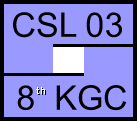|
|
We present a generalisation of first-order unification to the practically important case of equations between terms involving binding operations. A substitution of terms for variables solves such an equation if it makes the equated terms alpha-equivalent, i.e. equal up to renaming bound names. For the applications we have in mind, we must consider the simple, textual form of substitution in which names occurring in terms may be captured within the scope of binders upon substitution. We are able to take a `nominal' approach to binding in which bound entities are explicitly named (rather than using nameless, de Bruijn-style representations) and yet get a version of this form of substitution that respects alpha-equivalence and possesses good algorithmic properties. We achieve this by adapting an existing idea and introducing a key new idea. The existing idea is terms involving explicit substitutions of names for names, except that here we only use explicit permutations (bijective substitutions). The key new idea is that the unification algorithm should solve not only equational problems, but also problems about the freshness of names for terms. There is a simple generalisation of the classical first-order unification algorithm to this setting which retains the latter's pleasant properties: unification problems involving alpha-equivalence and freshness are decidable; and solvable problems possess most general solutions.
|
© 2002-2003 Kurt Gödel Society, Norbert Preining. |
2003-06-04


 | |

 Print this page
Print this page
